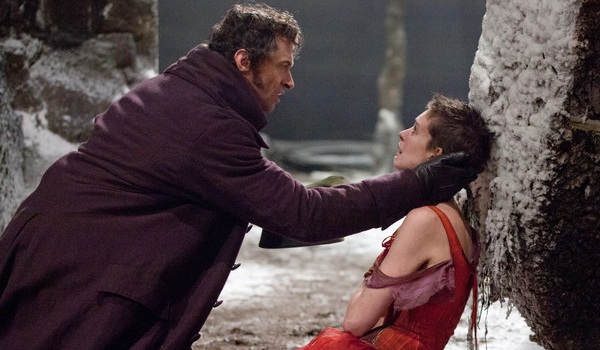Les Misérables Review
Posted on December 26, 2012 By John Gilpatrick 2012, Movie Reviews, New Releases
Les Misérables is a boxer too intent on landing a knockout punch. Every swing for the fences leaves it open to attack. Director Tom Hooper actually lands his jabs. The film’s softer, less stylized moments are both effective and affecting. When Hooper’s manic camera plants its ass in front of the tragic faces of Anne Hathaway and Eddie Redmayne, it’s exceptional. These moments, sadly, are few and far between. It would be unfair to call the film unsuccessful because the music and performances are so enjoyable, but it definitely doesn’t hit that punch it so wildly swings for.
The movie covers nearly two decades in the lives of two French men during the early- to mid-1800s. Jean Valjean (Hugh Jackman) opens the film a slave. Javert (Russell Crowe) enforces the law and actually grants Valjean his freedom. But with this freedom comes a cost: His paperwork labels him a “dangerous” man. He can’t get a job, a meal, even a bed. So he steals from a priest. He’s caught, but the priest grants him sanctuary under the condition that he try to salvage his life.
Jump ahead a few years and Valjean has adopted a new identity. He’s actually a factory owner and the mayor of a small Parisian suburb. He dedicates his life to God and the principles of mercy and fairness. But Javert’s appearance in town challenges those convictions.
Meanwhile, Fantine (Anne Hathaway), has just been fired from her job at Valjean’s factory for keeping her child a secret from management. Young Cosette stays with two innkeepers (Sacha Baron Cohen and Helena Bonham Carter), and her mother ends up living on the streets and selling her body to pay for the girl’s medicine. Valjean learns of the injustice and promises to care for the girl himself, which he does into his autumn years when an older Cosette (Amanda Seyfried) begins to fall for the revolution-minded Marius (Eddie Redmayne) just as movement against the crown starts building real traction.
If you don’t like musicals, you’ll absolutely loathe this film. Every line of dialogue is sung. It’s a bit irritating, frankly, when musical moments are so plainly conversation-based, but most of the true productions are quite good. “Master of the House” with Cohen and Carter is laugh-out-loud funny. “One Day More” is a real show stopper that brings the house down.
But the film’s brightest moments are its two simplest numbers. “Empty Chairs at Empty Tables” features a devastatingly vulnerable Eddie Redmayne and a relatively static camera. “I Dreamed a Dream” one-ups that production on both fronts—Anne Hathaway is simply heartbreaking, and gratefully, the camera doesn’t move once.
Hooper, so assured in his stewardship over The King’s Speech two years ago, is actually the film’s biggest problem. He makes certain stylistic choices (like the camera’s over-reliance on Dutch angles) that get in the way of what’s organically brilliant material. To be fair, his decision to film his singers live is a great one. But the extreme close-ups are mostly heavy-handed, and some individual shots are groan-inducing.
Hugh Jackman, it must be said, is terrific—the best pure performer in the cast. His co-lead, Crowe, isn’t as gifted vocally—far from it, actually—but his presence is welcome. He nails Javert as a character. Amanda Seyfried and Samantha Barks, meanwhile, are merely adequate. The former has too little to do (maybe a good thing?), and the latter—a rookie film actress—seems a tad overwhelmed despite having an exceptional singing voice.
Predictably, the costumes, production design, and makeup are all on point. Oscar nominations will come in the boat loads. The film’s faults, as described above, ultimately come down to personal preference. People are going to love this movie, and for good reason. It’s handsome and well-acted, and the music honestly doesn’t get any better.
But for many, myself included, the approach to capturing these musical numbers was flawed from conception. The beauty of transferring a piece of work from stage to screen is the ability to break physical boundaries. Les Mis does this on occasion, but never with any consistency. As a result, it feels out of control. You have fun, but you’re always aware of how problem-ridden it is.
2012, 3 Stars, Amanda Seyfried, Anne Hathaway, Chris Dickens, Danny Cohen, Eddie Redmayne, Eve Stewart, Helena Bonham Carter, Hugh Jackman, Les Miserables, Melanie Ann Oliver, Paco Delgado, Russell Crowe, Sacha Baron Cohen, Samantha Barks, Tom Hooper, William Nicholson

















One Response to Les Misérables Review